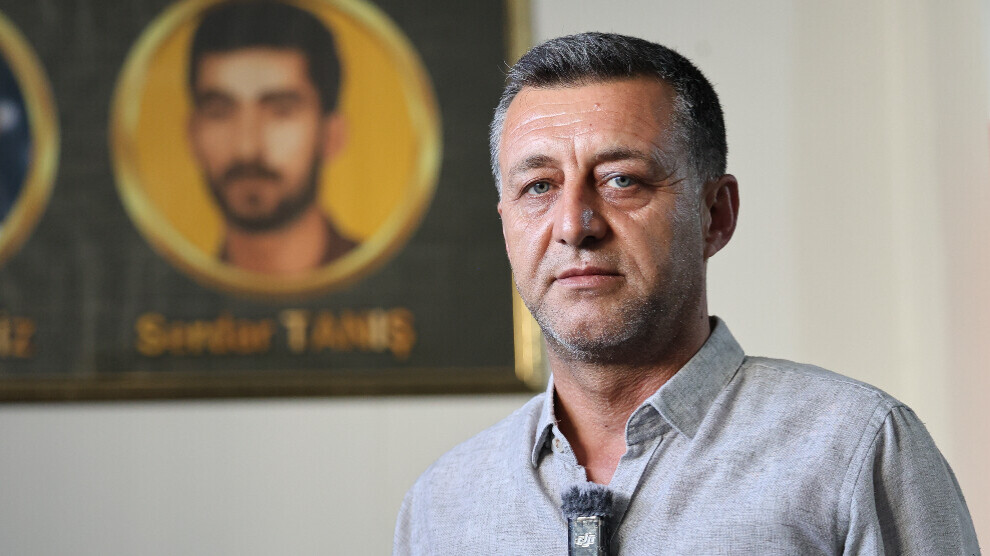No justice without investigation
Twenty-four years after the disappearance of HADEP politician Serdar Tanış, his brother Yakup accuses the Turkish state of systematic cover-up and impunity.
Twenty-four years after the disappearance of HADEP politician Serdar Tanış, his brother Yakup accuses the Turkish state of systematic cover-up and impunity.

Impunity continues for the “unsolved” political murders committed in the 1990s in Turkey, carried out under the orders of the government of the time, and with the involvement of soldiers and village guards in the region. Despite confessions, no sanctions have been imposed on any of the officials who served during that period. Most of the legal cases have resulted in acquittals. One such case is the file concerning Ebubekir Deniz and Serdar Tanış, members of the People's Democracy Party (HADEP), who disappeared in the town of Silopi (Silopiya) in the province of Şırnak (Şirnex).
The European Court of Human Rights (ECHR) ruled against Turkey in the case, yet the real perpetrators were never identified. Yakup Tanış, the brother of Serdar Tanış, stated that justice has still not been served, even after all these years.
Serdar Tanış, district chair of the HADEP, was taken into custody by Turkish forces in 2001 and has not been heard from since. His brother, Yakup Tanış, current district co-chair of the Peoples' Democratic Party (HDP) in Silopi, spoke to ANF about the ongoing struggle for justice.
Tanış said, “We are living through this unjust and immoral war the state has waged against the Kurdish people for the past 50 years. Serdar was one of the thousands who were targeted in this war.”
Şırnak was a laboratory of state terror
Tanış described the political atmosphere of the time, saying: “No law was valid in Şırnak. Every form of pressure, lawlessness, and torture was first tested there before being spread across all of Kurdistan. Şırnak was a laboratory. Only five people were needed to establish the district branch of the HADEP, but it could not be completed due to the constant pressure. It was only when Serdar became district chair that they were finally able to open the organization. Everyone who had tried before was threatened, threatened with their families, and forced to resign. Serdar resisted.”
It began just one week later
Tanış explained that the party office was reopened on 18 January 2001, but just one week later, Serdar Tanış and fellow party member Eyyüp Kaya were stopped by a civilian vehicle while on their way to apply for a telephone line for the newly opened office. He continued: “The men who got out of the vehicle told Serdar that he needed to give a statement. Serdar objected, saying, ‘I am the district chair. If I am required to testify, I must be summoned through proper procedure.’ They backed off in the middle of the street, but shortly after, Serdar was summoned by the district gendarmerie command and had no choice but to go.”
He never came out again
“Ebubekir said, ‘Don’t go alone, I’ll come with you.’ A local shopkeeper named Ömer Sansur gave them a ride. At the entrance of the district gendarmerie, they encountered two village guards from our village. Serdar told them, ‘I’m going to give a statement, and then I’ll leave.’ That was the last moment Serdar was seen. When he didn’t return home by evening, we, as a family, went to the station. Lawyers got involved, and meetings were held with the gendarmerie. But the district gendarmerie commander claimed, ‘No such individuals came here.’ Yet we had witnesses, those who gave Serdar a ride, those who saw him at the entrance, even the guards he greeted while entering. Everything was in plain sight.”
The legal struggle continued
Yakup Tanış emphasized that they never gave up on their legal fight and shared the following: “Journalist Celal Başlangıç’s headline in Radikal newspaper had a major impact. The title ‘Find them alive’ brought the case to public attention. We gathered documents, revealed witnesses. Still, the state chose to turn a blind eye. The file was brought before the ECHR by Osman Baydemir, then head of the Diyarbakır (Amed) branch of the Human Rights Association (IHD), and human rights lawyer Tahir Elçi. Something unprecedented happened at the ECHR: even before all domestic legal avenues were exhausted, the court accepted the case within just five hours. Turkey was found guilty of failing to conduct an effective investigation, but despite that ruling, the perpetrators are still protected. Neither my brother has been found, nor those responsible for his disappearance held accountable.”
It was a systematic policy of the state
Tanış underlined that what happened was not an isolated incident but part of a systematic state policy and said: “Serdar’s disappearance was not just about one person. Thousands were disappeared in the 1990s. In the 2000s, threats, torture, and political operations continued. This was an organized attack aimed at denying the existence of an entire people. It was a crime against humanity. The body of Mother Taybet was left lying in the street for days. That is an assault on human dignity. The state mentality targeted nature, culture, and our elders. This war was unjust and immoral. The state must now offer self-criticism. A Truth Commission must be established. The names of the perpetrators must be revealed. Peace is only possible through confrontation. This is not about politics, it is about humanity. History does not remember short-term political maneuvers; it remembers those who take great steps. The state cannot move forward without confronting its past. It must take a stance that protects human dignity. There is no other way. The more the state insisted on war, the more it rotted from within.”